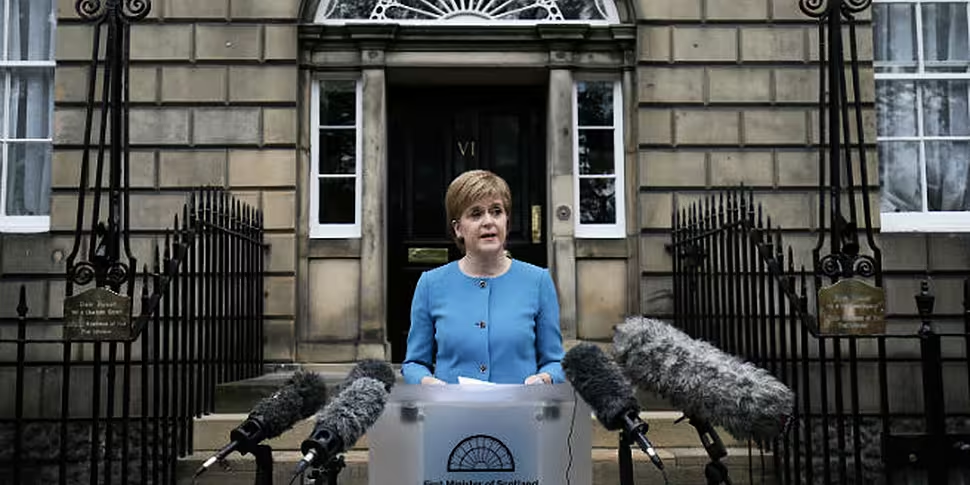‘Seismic’ is almost an understatement - the impact of Brexit has legitimately rocked the very foundations of the British political establishment.
It was a weekend of political confusion, panic and uncertainty across the Irish Sea. Even the Leave campaign leaders didn’t seem to know exactly how to react.
And yet, as the two biggest British political parties were thrown into states of internal turmoil, there was one leader in particular who seemed to take the shock result in her stride. You had to look towards Edinburgh, though, to see a genuinely decisive, proactive response to Thursday’s referendum.
***
Barely hours after the ‘Leave’ campaign’s victory became apparent, the political aftershocks were obvious. By 8.30am, Prime Minister David Cameron had announced his plans to resign - arguably a noble, resolute act after a very clear defeat, but one that unavoidably plunged his already deeply divided party into what is likely to be a long and heated leadership contest.
The Conservative ‘Leave’ figureheads, meanwhile, responded with a sort of disbelief that they’d actually won. Boris Johnson’s post-referendum speech was high on rhetoric but lacking in any sort of concrete next steps - other than the suggestion there shouldn’t actually be any rush to kick start the Brexit process by invoking Article 50.
Nigel Farage was much more animated in his celebrations. He did acknowledge the need for a hasty start to trade negotiations, although also attracted plenty of controversy when he admitted Leave campaign’s key promise of £350 million funding for the NHS a week wasn’t actually all that accurate. However, UKIP’s political role will be very limited in the immediate future: a further election will tell whether the Eurosceptic referendum result will translate to the party gaining any more influence in parliament beyond their current single MP. Perhaps Farage won't even mind that much if he doesn't win a seat next time around, given one of his grandest ambitions has now been achieved.
We have done it! #IndependenceDayhttps://t.co/C96aoqlnpM
— Nigel Farage (@Nigel_Farage) June 24, 2016
Labour, meanwhile, joined their Conservative rivals in plunging into internal crisis. Jeremy Corbyn’s speech on Saturday afternoon was a more practical and forward-looking piece of oration than most of the previous day’s speeches. Unfortunately, the last 48 hours have seen him face a coup as his shadow cabinet members have resigned in huge numbers, many criticising his leadership capabilities (or lack thereof, depending who you listen to). Not to mention that the resounding ‘Leave’ vote in many traditionally Labour areas: Corbyn faces a challenge reconnecting with his party’s voter base, not just his MPs.
Amid all the internal party squabbling, lack of direction and some genuine shock in England, Scotland’s First Minister Nicola Sturgeon - who is meeting with President Higgins today - dealt with the referendum result with the sort of clarity and confidence she has become increasingly known for.
Scotland, of course, delivered a resounding Remain vote, as did Northern Ireland. Sturgeon’s own speech in the immediate aftermath of the vote inevitably recommitted to her SNP party’s core quest for Scottish independence, but also offered one of the fairest and most balanced assessments of the referendum campaign.
Watch @NicolaSturgeon give her statement in response to the #EUref result. #indyref2https://t.co/JzsyQW81E2
— The SNP (@theSNP) June 24, 2016
However, it was her speech following an emergency cabinet meeting on Saturday morning that really highlighted a level of leadership not seen elsewhere in the UK (indeed, Cameron’s first cabinet meeting wasn’t until today). It was a brief speech that nevertheless reassured people that practical steps were being taken:
She confirmed would seek to enter into "immediate discussions" with Brussels to "protect Scotland's place in the EU". She announced she would invite EU diplomats to Edinburgh for discussions. She also indicated her cabinet is preparing to work on legislation to allow for the option of another independence vote
Of course, Sturgeon is in no position to actually guarantee a second independence referendum - and indeed she is unlikely to hold one if there isn’t popular support for such a prospect. However, her commitment to taking measures to proactively respond to the Brexit vote was something that was not seen elsewhere in the UK this weekend. Other politicians, quite frankly, seemed to be stalling for time after a result few - on either side - seemed properly prepared for.
One could easily argue that Nicola Sturgeon’s actions failed to fairly acknowledge the overall democratic ‘Leave’ vote - and her suggestion that the Scottish Parliament could block Britain leaving the EU is likely to frustrate many. She is undoubtedly using the opportunity to forward her own party’s political agenda after the rejection of the 2014 referendum. Her opposition to the looming Brexit could ultimately prove her own - and indeed her party’s - downfall if it doesn’t translate to a significant increase in the Scottish public’s passion for independence and remaining in the EU.
And yet, in a time of extreme political turmoil in Britain, it is slightly startling how her level of leadership was not echoed down in England. As internal squabbles threaten to tear the Labour and Conservative parties apart, Nicola Sturgeon’s confident response to the referendum result stands almost alone. And unfortunately for MPs in Westminster - deeply divided even within their own party ranks - she’s the very one who continues to threaten to split the UK apart.









